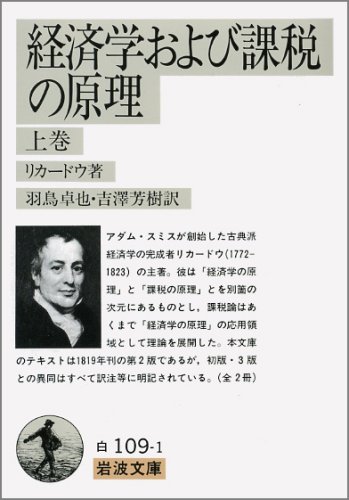- 著者
- 羽鳥 卓也 千賀 重義 Robert Chapeskie
- 出版者
- The Japanease Society for the History of Economic Thought
- 雑誌
- 経済学史研究 (ISSN:18803164)
- 巻号頁・発行日
- vol.59, no.2, pp.118-161, 2018 (Released:2019-09-02)
- 被引用文献数
- 1
Introduction by Ken Mizuta and Shigeyoshi Senga The text of which this is a translation is Chapter 4 of Takuya Hatori (1922-2012)ʼs Kotenha Keizaigaku no Kihon Mondai (The Fundamental Question of Classical Economics), Tokyo: Miraisha, 1972. It had originally been published as an article with the same Japanese title, but Hatori gave it the slightly different English title ʻRicardoʼs theory of value and distribution in his Essay on Profitsʼ in Fukushima Universityʼs Sho―gaku Ronsyu― (The Journal of Commerce, Eco-nomics and Economic History), 34 (3), 91-151, 1965, and then added some re-visions, in particular a ʻtotal rewriteʼ of Section 5, when it was included in the book cited above. Before the publication of the article just noted, Hatori had presented a report entitled ʻEarly Ricardoʼs theories on distributionʼ at the 29th Annual Conference of the Japanese Society for the History of Economic Thought held in September 1965 at the Otaru University of Commerce, and ac-cording to the postscript of the original article ʻin substance this included the content of this text up to Section 4.ʼ Hatori states that he wrote the article after having given his presentation and considered the criticisms it elicited. Hatori began his academic work in the field of Japanese economic history but later shifted his region of research to the broad range of economic thought, from figures such as John Locke and Jean-Jacques Rousseau in the era of the civil revolution to classical economists in the eighteenth and early nineteenth centuries. Above all, he devoted his energies to study of British classical econo-mists like Adam Smith, Thomas Robert Malthus, and David Ricardo. Hatori particularly concentrated his efforts on the examination of Ricardoʼs economics.
1 0 0 0 OA 戦後マルサスの穀物法改正論
- 著者
- 羽鳥 卓也
- 出版者
- The Japanese Society for the History of Economic Thought
- 雑誌
- 経済学史学会年報 (ISSN:04534786)
- 巻号頁・発行日
- vol.30, no.30, pp.1-9, 1992 (Released:2010-08-05)
Ricardo proposed concerning the revision of the corn laws in 1822 that a fixed duty of ten shillings per quarter should be imposed on importation of wheat finally. But his proposal means a countervailing duty for the peculiar taxes which are imposed on the corn growers, over those which are imposed on the other classes of producers in the country.Now, Malthus asserted in 1826 that a duty on importation not too high, and a bounty on exportation nearly such as was recommended by Ricardo, would probably be best suited to the present situation. Though his opinion resembled Ricardo's proposal in appearance, yet the duty proposed by Malthus did not mean a countervailing duty.Malthus supported the protection to agriculture by adopting the policy of restricting the importation of corn. Since 1814, however, he has had misgivings about very high duties, operating alone, are peculiarly liable to occasion great fluctuations of prices. And then, he proposed a duty not too high as well as a moderate bounty, with a view to prevent the great fall of prices that might be occasioned by a glut.
- 著者
- 羽鳥 卓也
- 出版者
- 経済学史学会
- 雑誌
- 経済学史学会年報 (ISSN:04534786)
- 巻号頁・発行日
- vol.26, no.26, pp.37, 1988 (Released:2010-08-05)
1 0 0 0 OA 古典派蓄積論の形成と発展
- 著者
- 羽鳥 卓也
- 出版者
- The Japanese Society for the History of Economic Thought
- 雑誌
- 経済学史学会年報 (ISSN:04534786)
- 巻号頁・発行日
- vol.4, no.4, pp.9-18, 1966 (Released:2010-08-05)
1 0 0 0 経済学および課税の原理
- 著者
- リカードウ著 羽鳥卓也 吉澤芳樹訳
- 出版者
- 岩波書店
- 巻号頁・発行日
- 1987


